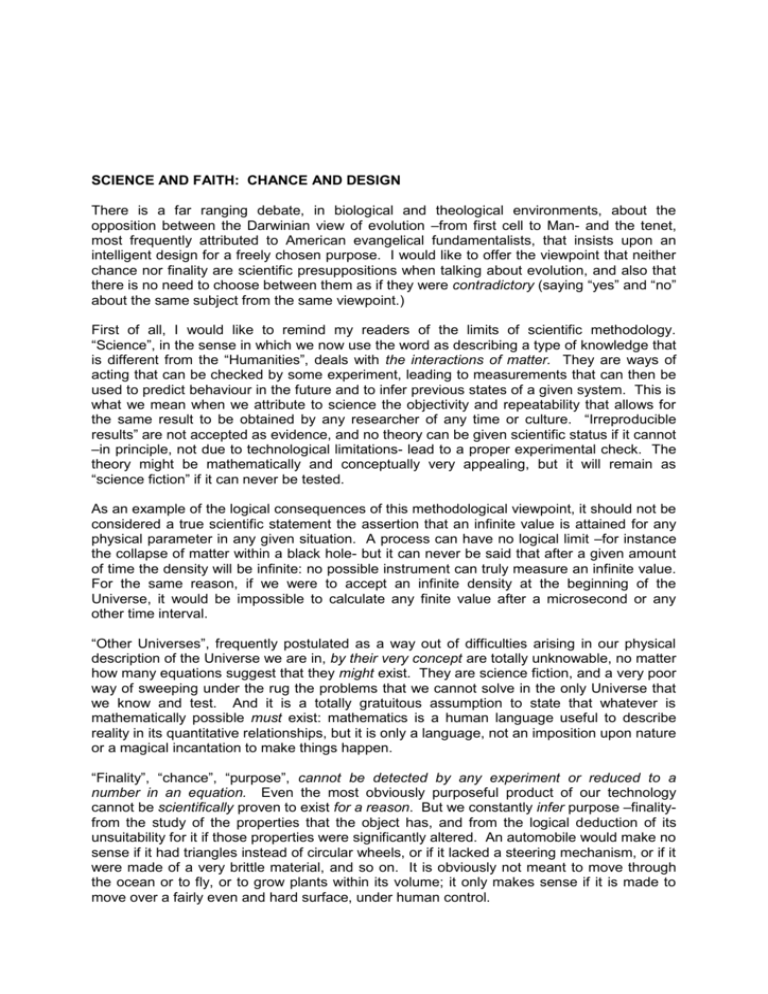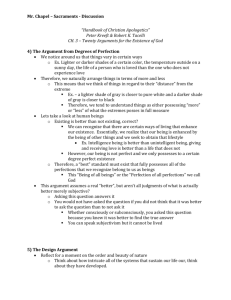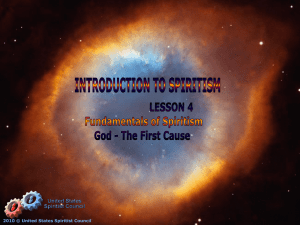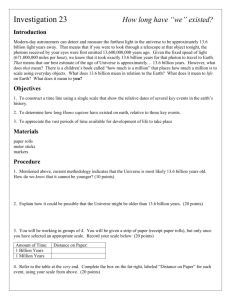science and faith: chance and design
advertisement

SCIENCE AND FAITH: CHANCE AND DESIGN There is a far ranging debate, in biological and theological environments, about the opposition between the Darwinian view of evolution –from first cell to Man- and the tenet, most frequently attributed to American evangelical fundamentalists, that insists upon an intelligent design for a freely chosen purpose. I would like to offer the viewpoint that neither chance nor finality are scientific presuppositions when talking about evolution, and also that there is no need to choose between them as if they were contradictory (saying “yes” and “no” about the same subject from the same viewpoint.) First of all, I would like to remind my readers of the limits of scientific methodology. “Science”, in the sense in which we now use the word as describing a type of knowledge that is different from the “Humanities”, deals with the interactions of matter. They are ways of acting that can be checked by some experiment, leading to measurements that can then be used to predict behaviour in the future and to infer previous states of a given system. This is what we mean when we attribute to science the objectivity and repeatability that allows for the same result to be obtained by any researcher of any time or culture. “Irreproducible results” are not accepted as evidence, and no theory can be given scientific status if it cannot –in principle, not due to technological limitations- lead to a proper experimental check. The theory might be mathematically and conceptually very appealing, but it will remain as “science fiction” if it can never be tested. As an example of the logical consequences of this methodological viewpoint, it should not be considered a true scientific statement the assertion that an infinite value is attained for any physical parameter in any given situation. A process can have no logical limit –for instance the collapse of matter within a black hole- but it can never be said that after a given amount of time the density will be infinite: no possible instrument can truly measure an infinite value. For the same reason, if we were to accept an infinite density at the beginning of the Universe, it would be impossible to calculate any finite value after a microsecond or any other time interval. “Other Universes”, frequently postulated as a way out of difficulties arising in our physical description of the Universe we are in, by their very concept are totally unknowable, no matter how many equations suggest that they might exist. They are science fiction, and a very poor way of sweeping under the rug the problems that we cannot solve in the only Universe that we know and test. And it is a totally gratuitous assumption to state that whatever is mathematically possible must exist: mathematics is a human language useful to describe reality in its quantitative relationships, but it is only a language, not an imposition upon nature or a magical incantation to make things happen. “Finality”, “chance”, “purpose”, cannot be detected by any experiment or reduced to a number in an equation. Even the most obviously purposeful product of our technology cannot be scientifically proven to exist for a reason. But we constantly infer purpose –finalityfrom the study of the properties that the object has, and from the logical deduction of its unsuitability for it if those properties were significantly altered. An automobile would make no sense if it had triangles instead of circular wheels, or if it lacked a steering mechanism, or if it were made of a very brittle material, and so on. It is obviously not meant to move through the ocean or to fly, or to grow plants within its volume; it only makes sense if it is made to move over a fairly even and hard surface, under human control. Human thought (not just the activity of neurons when we think) cannot be experimentally checked; the same applies to the possible value of an idea when writing a poem. In fact, neither the literary value of any book nor the artistic level of a painting can be experimentally proven. This is also true of our family relationships, our sense of duty, of our social concerns: all that constitutes truly human life and culture is impossible to detect and quantify following strict scientific methodology. In science itself, the ultimate questions cannot be answered by any equation. In the words of John Archibald Wheeler1, the most important one is “why is there something instead of nothing”. This lies outside of Physics, to be the object only of a Metaphysical inquiry. Or, as Stephen Hawking admits, the equations describe a Universe, but they cannot explain why a Universe exists that follows the equations2. Time and again the ultimate “why” and “what for” of matter itself appears as an unsolvable mystery if we restrict our viewpoint to the experimentally provable facts. But we are not satisfied with the limited data and methods of science. During the second half of the past century, renowned cosmologists have proposed the “Anthropic Principle” 3, which tries to infer the purpose of the Universe from a detailed study of the consequences that would follow, according to physical laws, from changing any parameter of matter, already at the very beginning of its evolution. It must be said quite clearly that the quest for an answer requires leaving the purely physical way of thinking: it is a metaphysical principle that is being developed from the data of the sciences of matter. But it is quite logical to be interested in an answer, just as we are interested in the beauty of a poem and not only in the chemical composition of the paper and ink of the book where we find it. Wheeler presents the Anthropic Principle as indicating that the Universe points to intelligent life as the only satisfactory reason for the choice of parameters at the Big Bang itself. For that, he goes to the very core of the nature of matter as studied by science: it is “adjustable” to exist in many possible ways, since it is in constant change. And whatever can exist in different ways needs to be extrinsically determined to exist in a particular form rather than any other. We could say that the most universal statement about material beings refers to their dependence upon time, since any change implies different properties in successive moments. We are thus led to the need to accept either causality towards the past – Wheeler’s proposed solution, which is the ultimate example of circular reasoning- or the creation of matter by a non-material agent, not tied to time or space. But true creation necessarily implies an infinite power 4 -with knowledge of all the unlimited possibilities of making a Universe- and a choice of parameters for the one that is actually created. Such a choice implies a purpose. It would be absurd to consider as a sufficient reason for creation -by a non-material, personal Being- the simple existence of stars burning themselves out for billions of years, or the crawling of mindless biological entities on the surface of some planet. Physics finds that the most stringent limits on physical parameters are imposed by the existence of intelligent life at least in one place of the Universe; both Philosophy and Theology concur by stating that the only logical purpose of a personal Creator must be the existence of other personal beings – intelligent and free- that can know their debt of gratitude and partake of the happiness of the infinite source of being who wants to share its very life. From the viewpoint of Physics we can also establish the limits of material activity. Modern science accepts only four interactions –gravitational, electromagnetic, strong and weak nuclear- that define what matter is with an operational definition, typical of scientific methodology. None of those interactions includes consciousness, abstract thought or free will among its effects, thus leaving outside the realm of matter the most obvious activity of Man. If the Creator –personal, intelligent and free- is non-material, it is logical to accept the possibility of creating other non-material entities endowed with similar capabilities, even if at an infinitely lower level: only what is above matter can act in a way that surpasses the four interactions that define matter itself. Cosmic Evolution When the Universe springs into being, without any previous state from which to derive its properties (before the Big Bang there was no before) any initial set of parameters can be considered “arbitrary” in the obvious sense that there is no previous reason for it to exist instead of any other possible one. But a purposeful Creator -not limited by time constraints (proper only of matter)- can and must choose the initial conditions with full knowledge of the consequences for all time of making the Universe in a particular way, down to the most intimate nature of every particle and quantum of energy, and their activity at each moment of cosmic evolution. There can never be something unexpected or surprising for the Infinite Mind that sees all of cosmic history as present in its eternal “now”. This does not imply that at each turn the Creator is imposing with a “fiat” what each atom does: having created matter with properties that are suitable for the intended purpose, matter acts according to its laws, due to its nature. This viewpoint is misinterpreted when it is construed as denying human freedom. If I were able to build a time machine -not to travel to the future, but to observe it in a TV screen- I would know what will happen (both as a result of physical laws and of human choices) but my knowledge would not determine that what I observe will happen. The same could be applied to God’s total knowledge of the future as present: for God there are no waiting periods or unforeseen developments. And nothing –even knowledge- can be added as a result of cosmic evolution to the truly infinite Being, without possibility of change, as it is logically necessary to describe its nature when its existence is not limited by space or time. This is something that some recent theologians seem to forget when they propound a “Process Theology” in which the Divinity evolves and becomes more perfect by some kind of feedback from its own creation. From the first instant of the Big Bang to the present, nature develops structures that lead to the synthesis in massive stars of the elements necessary for life with its amazing complexity. When this evolution reaches the point of forming here on Earth a suitable environment, life appears, in spite of the infinitesimal probability of its happening5. Billions of years later, in an unpredictable series of small changes and catastrophic extinctions, living matter is finally ready for its role as partner of the human spirit in the unique “rational animal” that is Man. But matter can only evolve into new forms of matter: is thought and consciousness due to matter alone? Biological Evolution When we find that primitive life, as recorded in sedimentary rocks from billions or millions of years ago, was limited first to microscopic single cell organisms, and then developed into more and more varied and complex forms, it is illogical to deny evolution as a fact. Most species have become extinct through the ages, with the well known death of the dinosaurs 65 million years ago freeing our planet from their oppressive presence and thus opening the way for the full development of mammals. Only an obsessive reading of the Bible as a literal treatise of geology and biology (which had to be compatible with an apparent abundance of contradictory evidence) would imply that evolution never occurred. But the philosophical and theological problems in this field are not due to the facts that science presents with undeniable strength. The crux of the controversy lies in the added philosophical presuppositions regarding two key points: the driving force and mechanism for evolution in general, and the step from non-intelligent primates to Man. In the first case, the battle lines are drawn in terms of an “either-or” choice: evolution has happened either by chance alone (followed by the survival of the fittest and adaptation to the environment) or by an intrinsic drive impressed by the Creator according to an “Intelligent Design” where nothing happens by chance. It is here where a more nuanced use of words and better defined concepts become necessary to avoid extremes that might end up denying either evolution itself or even the existence of the Creator. “Chance” is not a measurable parameter of matter, like electric charge or mass. It cannot be put into an equation as a factor (even if the related concept “probability” can be used to compute an expected outcome.) In a more pedestrian way, one could say that “chance” is only a more polite term to reply to a question for which we do not have an answer, instead of saying “just because”. Why does a particular squirrel cross in front of my car today and gets killed? There is no reasonable way to establish a predictive correlation between my driving and the constant running around of the squirrel, and thus the answer is that the death of the animal under my car is a matter of chance. The same can be said of a cosmic ray with a given energy hitting a particular chromosome in a reproductive cell of a particular animal and causing a mutation. This is chance, and only chance, as seen from the viewpoint of science. In this sense, chance is a common element present in our life and in most of the independent happenings in the Universe. But each material interaction is a necessary consequence of the properties and forces present at each moment: there is no room in Science for any kind of “spontaneity” or “creativity” that would logically imply a degree of free will even in the most basic particles of matter. To say otherwise, besides being totally gratuitous, would undermine the possibility of certain predictions, and science would be impossible. But from the viewpoint of the infinite Mind that sees every detail of the entire cosmic evolution, from the Big Bang to its last gasp, there is never an unexpected happening. Chance cannot apply to the perfect foreknowledge that the Creator has, and that makes the choice of initial conditions and laws of development a sure way to obtain the finality for which creation is meant. There is no opposition or irreducible “either-or”, because chance and design are asserted at two different levels, and neither of those assertions is a subject for experimental verification. Scientific methodology cannot prove finality or its absence: in both positions we are introducing philosophical considerations to give a reason for facts that are accepted as such, but the reason cannot be found in the laws of nature –thus the appeal to “chance”- while Philosophy and Theology do provide an acceptable answer. The controversy regarding the teaching of evolution in school is misguided. Biology should cover the multiple stages of life on Earth, and explain the mechanisms through which mutations occur and are eventually such as to give rise to the present variety of species and individuals in all living forms. This is still a largely unfinished task, where eminent biologists are still baffled by their inability to explain very drastic evolutionary steps in terms of small changes6 and to attribute to the same environments (for instance, in the sea) the enormous range from single cells to animals like the octopus and the whale. The same can be said about the coincidence in the same organism of all the genetic changes needed for a significant evolutionary step, and the need for many individuals so changed to make it last. But the question of chance or design does not touch anything that biology has to deal with. That is a matter to be properly discussed in a Philosophy course, perhaps within the larger context of Cosmology and the reason “why there is something instead of nothing”. And in this approach, and only here, it is proper to discuss if the Universe has a purpose, both as a single complex entity with multiple levels of structure and activity, and in the individual happenings which Science necessarily attributes only to the necessity of physical laws and to the chance coincidence of unrelated events. The Origin of Intelligence Once more, the popular way to present the problem of Man’s origin is to state an “either-or” alternative: either by simple evolution from a primate, common ancestor of apes and Man, or by direct creation from inanimate clay to form the body (unrelated to other animals) where a spirit is then introduced. This is also construed to mean that in the first alternative there is no soul, just highly structured matter, while in the second one the soul is the defining element for the specific nature of Man as a “Rational Animal” and also the “Image and Likeness” of his Creator. The basis for a reasonable solution to the problem is found in the concepts of matter and of intelligence, both frequently used without the required first step of a suitable definition of each. No serious discussion is possible unless we first clearly state what we mean by each term, and the starting point cannot be an a priori philosophical position accepting only the existence of matter and explanations of reality based upon its activities.. As stated earlier in this essay, matter is defined in Physics in terms of its interactions. We do not have an intuitive grasp of essences, even for the most common objects in our daily experience, but we attribute patterns of activity to the nature of things, and thus we identify different objects by what they do. In the popular way of saying it, “if it looks like a duck, and waddles as a duck, and quacks as a duck, it is a duck”. O, in more scientific terms, if it has the mass of an electron, and the charge of an electron, and the spin of an electron, it is an electron. We accept four ways of acting that can be checked experimentally, and thus we state their effects and range and specify the objects subjected to each of them. The totality of the material world –particles, energy, the physical vacuum, space and time- are affected by gravitation, which causes attractions and distortions we need not describe in detail. Particles with something else –“electrical charge”- experience very strong attractions and repulsions that explain common properties like rigidity, hardness, chemical reactions, living structures. The two nuclear forces explain the atoms of the elements in the periodic table, their formation inside stars, the relative abundance of each element through cosmic history. There has been no need, as yet, to invoke a fifth force to cover any of the multiple happenings in any level of the material world. And the most basic law of Science states that in any interaction, “matter is never created or annihilated; just transformed”, even if the change can be as drastic as the disappearance of particles in the form of pure energy or the other way around. Other “conservation laws” (of net charge, of linear and angular momentum…) also restrict the way matter develops in our experiments. If we look for an explanation of Man, we cannot stop at this level. The most evident fact to each of us is our own consciousness, the awareness of thinking processes and of free choices. Chemistry, Physics and Biology can give a detailed description of all the energetic changes that take place when I bend my arm, but they cannot say why the arm bends when I want, and why I am conscious of bending it by a free choice. This consciousness, if due to the material activity of neurons in the brain, should logically contain –first of all- a clear awareness of such activity. But nobody knows even the existence of neurons unless the fact is learned in Biology and Anatomy: matter is not conscious of itself for anything internal to our own body. In the act of seeing, I am quite aware of the object I see, but not of the changes in the retina or the processing of signals in the brain. Consciousness cannot be attributed to matter according to its operational definition: none of the forces accepted by physics gives even a hint of being adequate to produce it. What is intelligence? We loosely talk about the intelligence of a dog or a dolphin, because they can be taught tricks, by training that produces a specific response –a way of acting- as a reaction to some stimulus (a command or a gesture.) More inexact still is the term when applied to computers, that have no interest in knowing anything or satisfaction in performing any computation, purely determined by an external programmer. But intelligence is not a way of acting, either by instinct, by conditioned reflexes or by electronic commands: it is a way of knowing, even abstract concepts that cannot enter the mind through the senses. Philosophy, pure Mathematics, the most modern scientific theories, are so far removed from our sense experience that even imagining their contents becomes impossible. We deal with aspects of reality that cannot be tied to our daily experience, and we value their logical beauty, their cogent necessity in abstruse proofs, their pure reasonableness. From Euclidean theorems in Geometry to the intricacies of Superstring theory, true intelligence is far removed from the realm of the four interactions of our experiments. This makes totally arbitrary and illogical the effort to attribute cultural developments of any kind to the blind actions of particles and energies. No scientist will accept claims of controlling an experiment by thought or will power: a proof of the deep-seated conviction that our thoughts and desires do not add anything to the material environment described by Physics. The same attitude is reflected even in the wrong efforts to reduce human personality to a genetic code –totally invariant from birth to death- as if all the achievements of the greatest genius in science, art or literature were nothing worth mentioning. This is the contradiction of trying to reduce everything to the activity of matter, when it is obvious that science itself cannot be identified with any atomic arrangement or series of energy changes. We are, consequently, faced with the undeniable double level of human activity, which requires two different sources, matter and spirit, intimately joined in a personal unity that is the subject of both, with mysterious mutual influences, but with clearly different functions. It would be absurd to deny our materiality, but one could say that it would be more illogical to dismiss our non-material consciousness. It is the search for Truth, Beauty and Goodness that drives the best efforts of our human existence, from the Stone Age caves to the present Space Era. Trying to reduce intelligence to matter, it is claimed –without any proof- that when matter in the brain is sufficiently structured, intelligence arises or emerges spontaneously as a new level of activity, but without any new element being present. This is totally void of explanatory power, even if it is reinforced with the example of modern electronics, where electrical currents are the only provable content of a TV image or the display of a computer screen. The show in my TV will not be entertaining or boring as a result of the quality of the electrical currents: we rather appreciate or blame the work of some mind in preparing the script and choosing the program contents. To say that there is nothing more in TV than a flow of electrons would be as superficial as to equate a Shakespeare play with the black stains on the pages of the printed version. If matter, even with the highest degree of order and structure in the brain, cannot produce thought, then it is impossible to attribute intelligence to the development through the ages of primates with higher and higher volumes of cerebral tissue. This is also incompatible with the fact that dolphins and elephants have more brain than we do, and hydrocephalic humans with extremely reduced cortex show no impairment of their minds. Man cannot evolve by simple material changes in the genetic programming of a previous non-human: thus the theory of evolution is falsely presented as a sufficient answer for our existence. It is true that biology must provide the suitable basis for the human spirit –and there is nothing shameful in using living tissues instead of dead clay for the purpose- but the human spirit can only be created by the spiritual Creator who is also the reason why the Universe exists. To say otherwise is not only poor Philosophy, but also poor Science. Science and Christian Faith We have reached a point where we have to accept that neither Science (Cosmology, Chemistry, Biology) nor Theology provide a complete answer to the “why” and “how” of the existence and evolution of the Universe and of ourselves in it. Both are limited ways of knowing a marvellous reality that surpasses our understanding at almost every step, even if data are always to be accepted, no matter how difficult it might be to include all of them into a coherent picture. We need the complementary viewpoints of different methodological approaches, and we have to be on guard not to introduce philosophical presuppositions or prejudices of any kind as a basis for what is presented as a scientific or theological assertion. Whenever a conflict has arisen during the past history of human thought, its roots can easily be found in the unconscious attempt to reduce all forms of knowledge to a single methodology, be it the experimental approach or the literal reading of the Bible. We should all learn from past mistakes and clearly state the meaning of key terms and the viewpoint from which each problem is presented, with its limitations and strict proofs. It is also quite evident that being a great theologian does not confer a special authority to speak about Science, any more than knowing a lot about Physics will entitle a PhD in that field to pontificate about questions of God’s existence or the purpose of the Universe and of Man. If this was always true, even in past ages when it seemed possible for a person to encompass all of human knowledge, it is patently clear today, when each specialist feels at home only in a small portion of any given science or theological study. All Wisdom is found eminently in the Infinite Being who speaks to us both with the book of Nature and with the words of Revelation. Being the absolute Truth, Order and Beauty, the Creator is also the ultimate foundation of the possibility of Science itself: in the words of Einstein, Science is possible because the world is not absurd: contradictions cannot exist between any two truths of any kind, that are partial reflections of the one Truth found in God. Emmanuel M. Carreira, S.J., PhD REFERENCES 1. WHEELER, J.A. The Universe as Home for Man. The American Scientist, Jan-Feb 1977 2. HAWKING, Stephen, A Brief History of Time, Bantam Books, New York 1988, p. 174 3. BARROW, J. and TIPLER, F., The Anthropic Cosmological Principle, Clarendon Press, Oxford 1986 4. Using the symbols of mathematics, the only way to obtain a number (any number) from zero would be to multiply it by infinity. Neither zero nor infinity can be used to refer to real things: strictly speaking they are not numbers. No finite power can produce something from nothing. 5. See in The Anthropic Cosmological Principle, p. 565: the odds for assembling a single gene by chance are of the order of 1 in10109 to 1 in 10217. The number of atomic particles in the Universe is considered of the order of 1090, about a trillion-trillion times smaller. For the entire human genome, the odds are impossible to even imagine: 1 in 1012 million. 6. BEHE, M.J., DEMBSKI, W.A., MEYER, S.C., Science and Evidence for Design in the Universe, Ignatius Press, San Fco. 2002, p. 113-128








